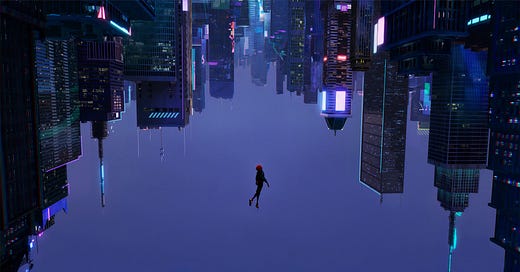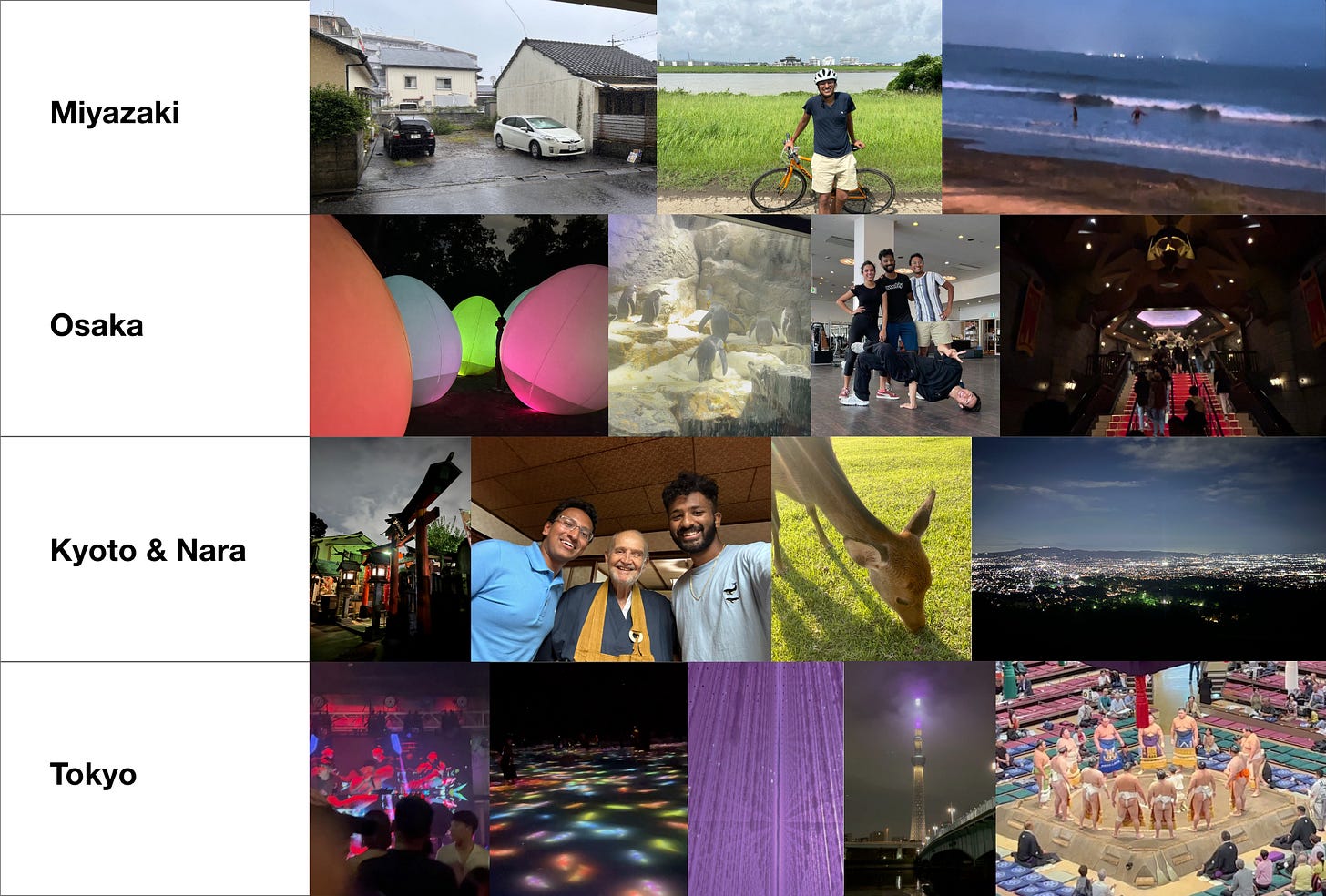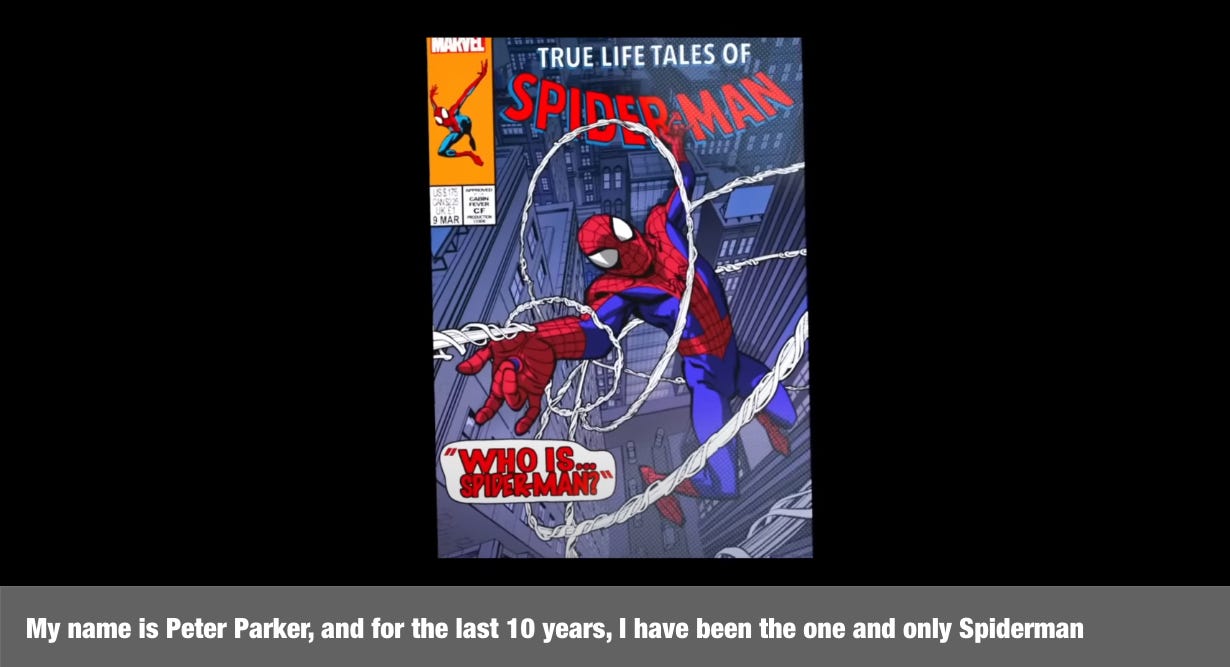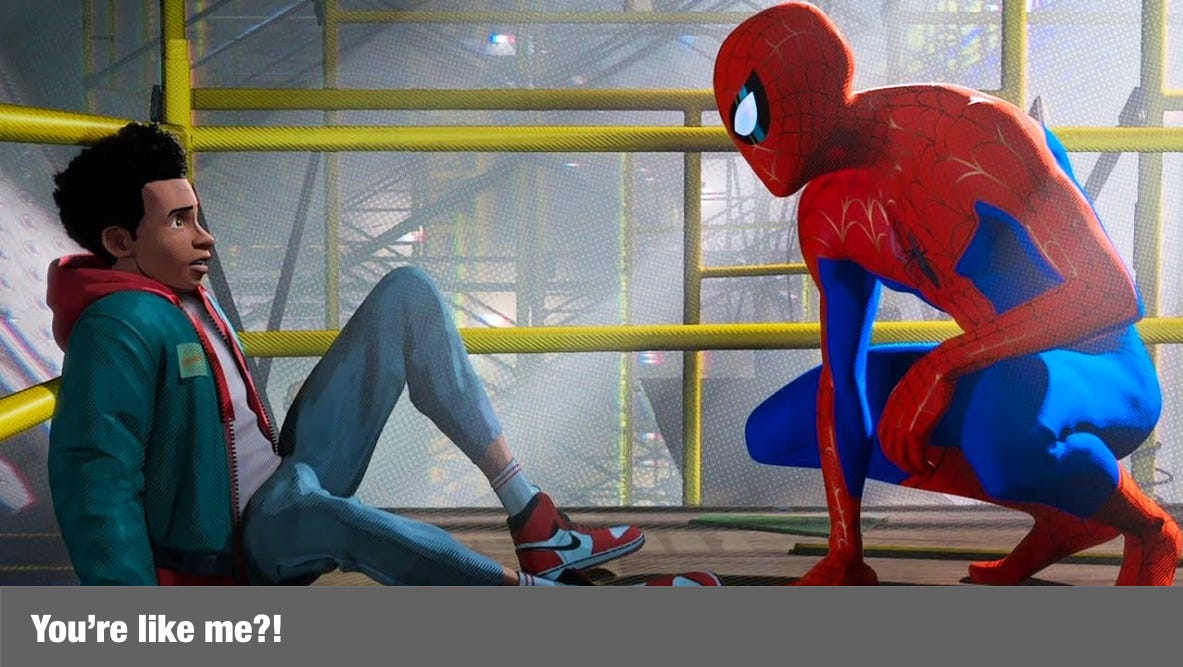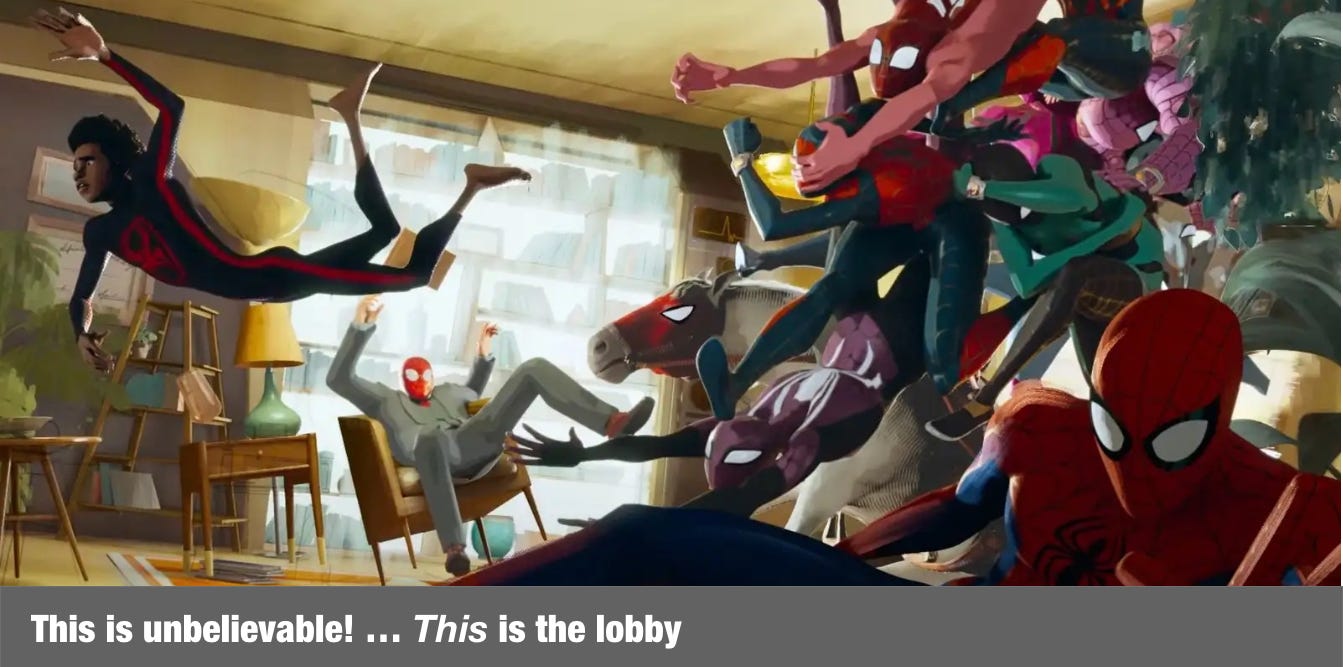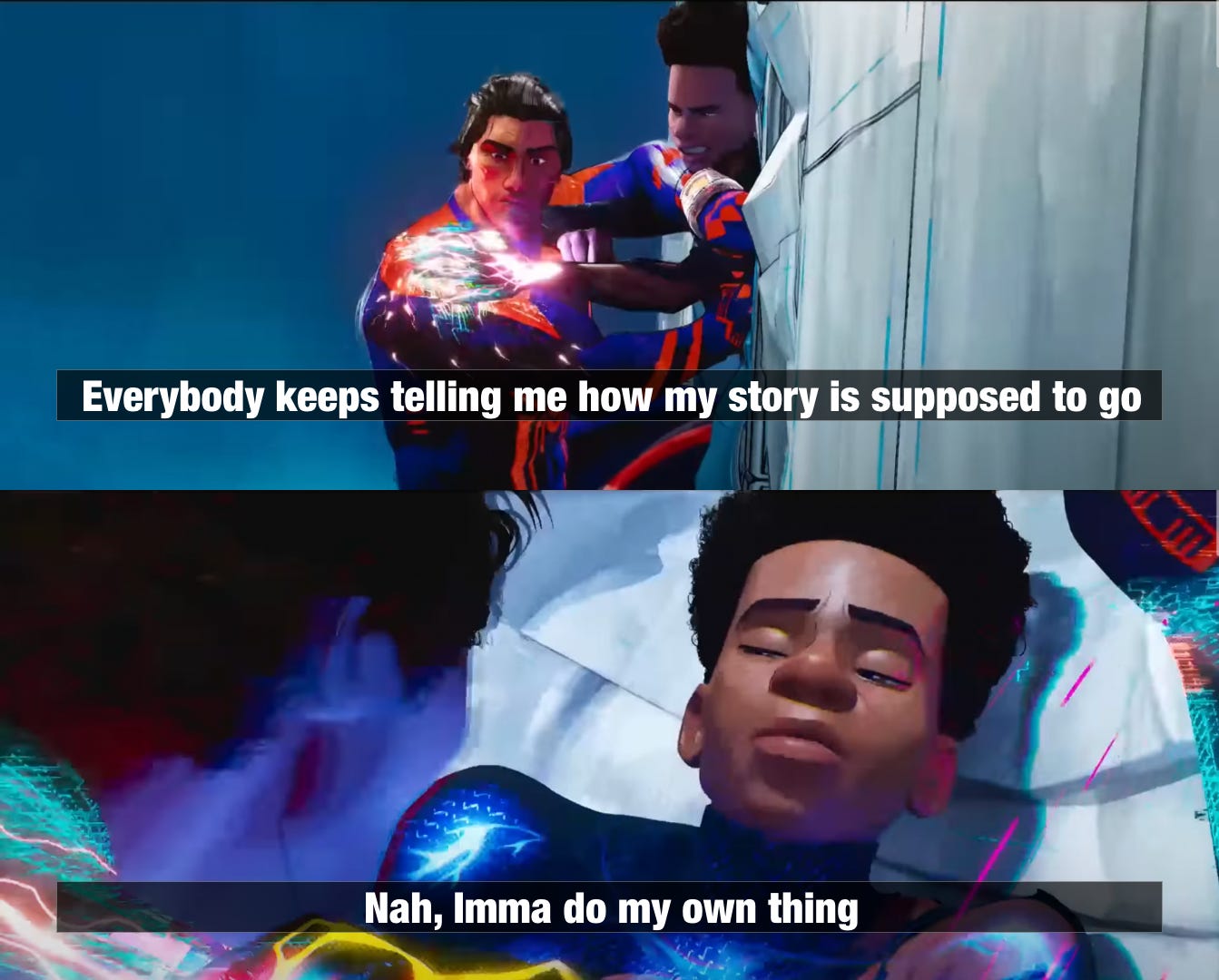October 16th, 2023: It’s been a little more than three weeks since my trip to Japan. I’m back home in San Francisco, but since I had given up my long-term lease before I left, I’m in an Airbnb with a friend in a new neighborhood. It’s been nice having a blend of the familiar, being back to where my friends are and where everyone speaks English, along with the touch of a new local culture and a new proximity to things to do and people to meet. I’ve realized I don’t mind changing homes and that I really appreciate how much better you get to know a city when living in different neighborhoods. Would love to continue this approach of short term rentals and moving around even just within a city and seeing where it takes me.
Going to Japan felt like jumping into a new dimension where something new and cool was around every corner. I got to spend one day in Kyoto with a Buddhist monk (the lessons of which I wrote about in my last post), another day learning how to surf in Aoyama, and another going to the futuristic teamLabs museum in Tokyo. These experiences were incredible. All the new friends, situations, and choices I was confronted with really helped me learn more about myself, grow, and understand a new part of the world and different ways of thinking. At the same time, this dimension felt like one where I did not have to worry about the burdens and responsibilities of figuring out what to do with my life.
Now I am back in my dimension where that responsibility to continue figuring out how I want to shape my life is very real, and in fact almost omnipresent. To do so, I’ve spent the last 3 weeks really taking stock of where I am and how I got here. So sit back, relax, and get your coffee because in this post I’m going all the way back to the beginning of when I left my job, retracing my steps through what I learned in my journey so far, and then projecting what I’m hoping to do next in the future.
Alright, let’s do this one last time, my name is Anant Agrawal
A few months ago, if you had asked me to imagine what my future could look like, I would have said my future was finding a city with acceptable trade-offs to settle in and then being either a Founder or a Product Manager in that city. I’ve always wanted to travel and see the world, but that felt like a dream out of reach perhaps until retirement. I didn’t know many people in my position doing anything else, but I had reservations about both paths.
I love Product, but being a Product Manager at a big company felt restrictive. I saw the same people every day, had similar conversations, and felt like no matter what I did I was struggling to squeeze life, social, travel, and deeply exploring new ideas around the rigid 9 to 5 commitment of endless meetings and having to be in the office at work. What was worse is that working harder and performing better would not ease these issues, but instead exacerbate them as I got more responsibilities and was further ingrained at the company.
Whenever I looked for a path outside of Product, I was pointed towards being a Founder as a natural next step and alternative path. Pursuing this path would give me more control over my schedule, allow me to do much more deep work, and come into contact with far more ideas and people, but at the same time I would be giving up even more of my time. Succeeding as a founder would mean being held accountable to the needs of a fastly growing number of employees, investors, and customers, which would be a trade-off in freedom and flexibility that I was not ready for. Even if I did want to be a founder, I had no idea what I would build as one.
But then one day, I met someone
I felt trapped. I had only ever considered two options and both did not feel right. I wasn’t really sure what I did want, much less how to get it. Then I met my first digital nomad, who became my roommate and one of my best friends and he changed what I thought was possible. He introduced me to Matt Yao’s Substack which led me down a path to Paul Millerd’s The Pathless Path and Rolf Potts’ Vagabonding.
Matt Yao was a Product Manager who left his job just like me. But Matt was able to think beyond the idea of finding that one purpose to dedicate 40+ hours a week to through climbing a career ladder or starting a company. Instead, he built a portfolio of projects like his newsletter and his podcast around the passions and lifestyle he wanted.
Paul Millerd was a consultant who after 10 years at a prestigious consulting firm burned out and quit his job. He was also lost for a while, but eventually found a passion for writing and decided to write a book. Instead of focusing on getting great results through great effort as he did when consulting, when writing his book he focused on doing what kept him excited about writing. This process helped him keep going, even when he had modest initial book sales. Eventually, his mediocre effort with mediocre results accumulated over the long term and led him to resonating with thousands of readers such as myself. He taught me that there were alternatives to the hustle centric or results centric way of thinking about life.
Rolf Potts gave up having any traditional job to travel the world, a privilege he unlocked not through wealth of resources, but a wealth of time and a frugal mindset. In his book, he discusses how learning to need less instead of getting more gave him the ability to lower the cost of his freedom. He references how he was inspired by Henry David Thoreau who through, “the simplicity with which he lived allowed him to work only six weeks each year and devote the rest of his time to writing and living.”.
Taking a leap of faith
As I read more about the extra-ordinary lives of these individuals what I found truly inspiring was how uninspiring the background of these folks were. There were not billionaires, monks, adrenaline junkies, or religious zealots. As Rolf Potts describes vagabonders, these people were simply ordinary people who made unordinary choices. Choices that I too could make.
After leaving my job, I felt a pull to immediately jump into another job in Product and get back to a life that was not perfect, but at least familiar. A life that would give my loved ones much less anxiety. But instead I decided to take a leap of faith. While my actions may have seemed random from the outside, to me there was a method to the madness: I was experimenting with new ways of living, inspired by the people who I had seen do it. Some concrete examples of what my leap of faith looked like are:
Before I would always give up on an idea if I could not see myself working on it 40+ hours a week. But following Matt Yao’s example, I took on a portfolio of projects such becoming a community data scientist for The Commons community I had joined, working part time at a company building AI Governance tools, and doing a civic tech fellowship. I took on these projects even if I did not want to pursue them full time, because the full time combination of them all was most exciting.
After a lifetime in tech, I started a newsletter writing about my ideas, feelings, and television. Instead of pursuing scale and fast growth, this time I defined success as just continuing to write and sharing with a small group of friends as Paul discussed in his post.
Before I might have taken a vacation or two a year with my family. Now I was trying short term travel alone through my trip to London and long term travel through my month long trip to Japan. I gave up my long term lease and became comfortable with moving around just like Rolf Potts does in his book. To have lived in 5 cities in 5 months would be unheard of just half a year ago.
It is tough to describe what I was doing to others: it was something along the lines of being intentionally funemployed, on sabbatical, or on The Pathless Path as Paul Millerd describes it. Whatever it was, it was unlike anything I had done before. I did not know where it would lead me, but I was excited to find out.
Discovering a new world
Getting to know these different ways of living was not life-changing because I wanted my life to be exactly like theirs or because I completely agreed with their ideas. It was life-changing because these were ways to live that I did not even know were possible, and that gave me hope. Hope that I did not have to fit my desires into the limited options I could imagine now, but that I could re-discover my desires and fit my options to what I really wanted. Hope that the life I was looking for was out there, and that I just had to find it.
I started trying all sorts of things. I curated my information diet, started reading more, and experimenting with my habits. I worked part-time remote, full-time in a 10 person office in the suburbs, and also not at all. I met a yoga instructor, a pro-hockey player turned chef in training, a race car driver, a public defender turned lawyer, a data scientist turned community leader, an international relations student who gave up his studies to surf, an Australian gentleman who left his home to spend 6 months biking along the countryside of Japan, and so many more interesting and different people with diverse perspectives on how to live life. Through experiencing all of this, here is what I learned about myself and what I want:
What I’ve learned so far
Embracing change is important
Being afraid of change is human nature. I am still afraid of change. I worry about going to places where I do not have my friends around, I worry about what can go wrong, I worry about losing the feeling that I have a home anywhere if I change my home every month. But I do feel less afraid of change now than I did before. Nothing is Permanent and so change will happen whether you are comfortable with it or not. I have learned more about myself and the world in last 3 months than the last 3 years. That would not have been possible if I had not embraced the fear of change through intentionally seeking it out. Instead of always hoping everything works out, I feel more confident I will be fine even if it doesn’t and this helps me take the right risks.
💡 Tip: I hope to embrace paths that give me the flexibility to embrace change and follow divergent paths as they arise, or that even bring these opportunities to me.
The antidote to loneliness is solitude
When I gave up my long term lease in San Francisco, I lost all sense of consistently having the same people around me. Before I rarely had time just to myself and now I spent the majority of my time alone. I learned that while connection to others was the single greatest cause of joy in life, loneliness cannot be overcome simply by surrounding yourself with others. Instead it can be thought of as a byproduct of the inability to enjoy one’s own company. I learned to embrace that solitude to do some of the most thought-provoking deep work of my life as well as to develop a relationship to myself through doing solitary activities like reading, walking the Earth, and playing the piano.
💡 Tip: Learn to treasure your own company and leave time in the week to just be by yourself. It is also when you do your best week. Pursue paths that allow for this time alone.
More is not always better
“Money, of course, is still needed to survive, but time is what you need to live. So, save what little money you possess to meet basic survival requirements, but spend your time lavishly in order to create the life values that make the fire worth the candle. Henceforth I ask not for good-fortune, I myself am good-fortune, Henceforth I whimper no more, postpone no more, need nothing” (Walt Whitman). The best things in life require your time: nurturing a relationship, taking a big risk doing what you love, seeing the world. Therefore, when deciding what to do, I focus less on what I have to gain and more on how this will affect the quality of my time.
💡 Tip: Fight to stay free, don’t ask yourself what you want to get rid of, ask yourself what you want to keep and get rid of the rest. This helps keep down the cost of your freedom.
Everything is interconnected
What I love about world travel is that it teaches you how to get along not just with people from the places in the world you travel to, but more broadly how to get along with all people from all different parts of the world. This is because the more people you meet, the more you understand what unites all people, and you begin to develop a belief in the common denominator among us all. For me, travel has helped me adopt the Buddhist belief that everything is interconnected: not just people, but all things. The more I do and the more I see, the more I feel that, when I try something new, I am not starting from scratch. All of my experiences are culminating together to help me push forward faster in whatever I do, even if it seems from the outside as completely different from anything I have ever done before.
💡 Tip: Don’t be afraid of starting over. Taking what you learned and starting different can help get you on the much faster path to where you want to go. Learnings translate and coming from a different vantage point can be a great strength. Don’t let feeling behind stop you from getting where you want to go.
Connection over scale
When I was successful as a Founder or Product Manager, I felt respected. When someone resonates with my writing (which happened for the very first time pretty recently), I feel understood and seen. The feeling is completely different and I have come to believe that this is what creative self-expression is all about. While deeply connecting with others is difficult, what is nice about it is that it can feel meaningful even when you just connect with a few people. You do not need the scale of hundreds of millions of people. In fact, even connecting with many more people in a lower quality way does not feel as meaningful. That is why going forward I want to prioritize connection over scale: it’s no longer just about how many people you help, but also how you help them and, just as importantly, how you help yourself.
💡 Tip: Be mindful of your feelings of achievement and your feelings of connection. Both are important and recognizing what elicits which feeling is an important self-learning.
Don’t be busy, be intentional:
Lin Manuel Miranda had the idea of Hamilton on vacation, J.K. Rowling had the idea of Harry Potter on a train ride, and Steve Jobs dropped out of school to just take classes he was interested in. Often great ideas come from what just looks like wasting time. When I was at Roblox I felt like I did a lot because I had a lot of meetings and things to do. Now, I spend a lot of time just searching, taking breaks and letting the mind wonder and it is often difficult to climb the mental hurdle of feeling like the day was not productive. But Tim Ferris described it well, “Slow down and remember this as you begin your travels: Being busy can be a form of laziness. Lazy thinking, and indiscriminate action. Being selective—in other words, doing less in a smart way—is usually the more productive and fun path.”
💡 Tip: Be weary of following the feeling of being productive. Bias towards searching, planning, questioning, and saying no even if it does not feel productive. When you hit a hell yes, go for it!
Don’t rush, pay attention
In the words of Friedrich Nietzsche, “our eyes find it easier on a given occasion to produce a picture already often produced, than to seize upon the divergence and novelty of an impression. It is difficult and painful for the ear to listen to anything new; we hear strange music badly.” Our mind shows us the world as it thinks it is, not as it actually is. Only by slowing down and paying attention can you notice the truly strange happening all around you: finding a shop selling ninja stars outside a temple, or seeing a person staring at a TV that has nothing on (both true stories). Small strange things can open up new worlds if you know how to focus and listen in for them.
💡 Tip: A tight deadline and a late start make for a great adrenaline rush. Always having too much to do can get you addicted to the rush of falling behind. If you feel this happening, start earlier and embrace doing less. It will give you the space to take things leisurely and really focus on what is around you.
Adventure as a mindset, not an activity
After a month in Japan, even having world class sushi and dealing with spontaneous rain became expected and more mundane, and life in San Francisco began to feel more exotic. While novelty and change can be powerful agents of reinvigoration, true adventure is a mindset, not a destination. For example, one of my favorite cold openings in a show is when, in Brooklyn 99, Jake Peralta is able to take the punishment of having the night shift and turn it into a great memory for the whole squad. Great shows like Brooklyn 99, Modern Family, and The Office don’t have to take place in exotic places to be funny and filled with wonder. It is the genius imagination of the writers that turn relatable situations into comedy gold. I believe that we can similarly leverage our imagination to transform our lives.
💡Tip: Leverage what you learn from the people you meet and the places you go to see new possibilities, even in the mundane (selling water in a store vs. a vending machine). For example, I only discovered my love of improv and my college improv team in Pittsburgh because a friend took me to an improv workshop in San Francisco. It took going somewhere else to find a whole new community at home.
Imma do my own thing
So, what does this all mean in practice? Having grandiose ideas is great, but I have concrete decisions to make like where to live, how to spend my time, who to spend time with, and what to do for a living.
I started this journey to figure out what I wanted to do next for work. Starting out with a world of possibilities, I do feel that I am making progress on that front. I know I want to do work that enables me to have a flexible schedule and where I can express myself creatively. Work that biases towards helping people in a deeper more personal way, even if at a smaller scale. Work that goes beyond just making me feel busy and instead allows me to do deep work. Putting this all together, I have decided that indie consulting, where I can focus deeply on a shifting array of short term projects and explore fields I had never considered before might be my great next adventure.
What I have come to realize, however, is that this journey has taught me how to live and that this learning is far more valuable than simply choosing an occupation. It has helped me learn how to appreciate what’s around me, made the world a less scary place, and helped me better understand myself. It has helped me associate freedom and adventure not with a place, but with myself and realize that you do not need to be extraordinary to live an extraordinary life. Beyond helping me find perfect circumstances, it has give me courage to take on all circumstances. It has taught me how to find different views on how to live life, but to still do my own thing. Most importantly, though, it has taught me how to write my own story on my own terms.

